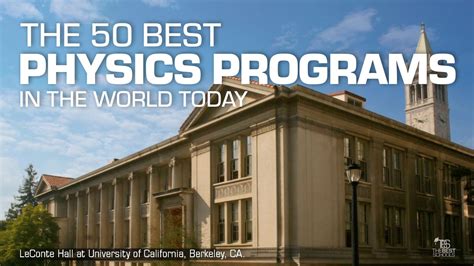Physics is a fundamental science that explores the nature of the universe, from the smallest particles to the largest galaxies. It is a challenging but rewarding field that can lead to careers in research, teaching, engineering, and more.

If you’re interested in pursuing a physics undergraduate degree, it’s important to choose a college that can provide you with the resources and support you need to succeed. Here are some of the top colleges for physics undergraduate:
- Massachusetts Institute of Technology (MIT)
- California Institute of Technology (Caltech)
- Stanford University
- Princeton University
- Harvard University
- University of Cambridge
- University of Oxford
- École Polytechnique Fédérale de Lausanne (EPFL)
- Swiss Federal Institute of Technology Zurich (ETH Zurich)
- National University of Singapore (NUS)
These colleges offer a wide range of physics courses, research opportunities, and faculty expertise. They also have a strong track record of placing their graduates in top graduate programs and careers in physics and related fields.
What to Look for in a Physics Undergraduate Program
When choosing a physics undergraduate program, there are a few things you should keep in mind:
- Faculty: The quality of the faculty is one of the most important factors to consider. Look for schools with a strong faculty in your areas of interest.
- Research: Physics is a research-intensive field. Make sure the school you choose has a strong research program and opportunities for undergraduate students to participate in research.
- Resources: Physics programs require a variety of resources, including labs, equipment, and computing facilities. Make sure the school you choose has the resources you need to succeed.
- Student life: Physics can be a challenging major. Make sure the school you choose has a supportive student community and resources to help you succeed.
Common Mistakes to Avoid
When choosing a physics undergraduate program, it’s important to avoid these common mistakes:
- Not doing your research. Don’t just apply to the first school you hear about. Take your time to research different schools and find one that’s a good fit for you.
- Only considering the rankings. Rankings are important, but they’re not the only thing you should consider. Look for schools that have a strong reputation in physics and that offer the resources and support you need to succeed.
- Not visiting the school. It’s important to visit the school you’re considering attending. This will give you a chance to meet the faculty, see the facilities, and get a feel for the campus culture.
How to Apply to Physics Undergraduate Program
The application process for physics undergraduate programs can vary from school to school. However, there are some general steps you can follow:
- Research your schools. Start by researching different schools and finding ones that are a good fit for you. Consider factors such as the faculty, research opportunities, resources, and student life.
- Take the SAT or ACT. Most schools require applicants to submit SAT or ACT scores. Make sure you take these tests early and prepare yourself thoroughly.
- Write your personal statement. The personal statement is your chance to tell the schools why you’re interested in physics and why you’re a good fit for their program. Make sure you write a strong personal statement that highlights your strengths and interests.
- Get letters of recommendation. Letters of recommendation are important for supporting your application. Ask teachers, counselors, or other adults who know you well to write you letters of recommendation.
- Submit your application. Once you have completed your application, submit it to the schools you’re applying to. Make sure you submit your application by the deadline.
FAQs
-
What is the average starting salary for physics graduates?
The average starting salary for physics graduates is $64,000. -
What are the best careers for physics graduates?
Physics graduates can pursue a variety of careers, including research scientist, physicist, engineer, and teacher. -
What are the best schools for physics graduate school?
The best schools for physics graduate school include MIT, Caltech, Stanford, Princeton, and Harvard. -
What are the most common mistakes that physics graduates make?
The most common mistakes that physics graduates make include not applying to the right schools, not preparing for the SAT or ACT, and not writing a strong personal statement.
Conclusion
Choosing the right physics undergraduate program is an important decision. By following the tips in this article, you can increase your chances of finding a program that’s a good fit for you and that will help you succeed in your physics career.
